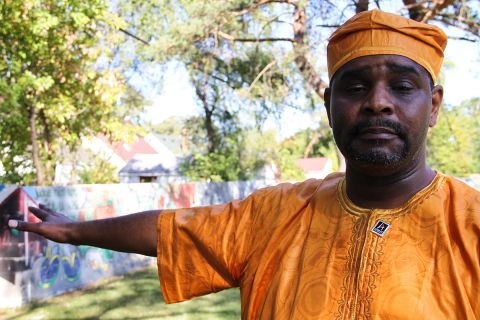Last year, the Birwood Wall was added along with New Bethel Baptist Church, the Rosa L. and Raymond Parks Flat, Shrine of the Black Madonna of the Pan African Orthodox Christian Church and the WGPR-TV studio. Brian Egan, president of the Michigan Historical Commission, said the historic markers educate future generations about the country’s complicated history.
“Maybe it’s not always positive, maybe it’s not always something we want to share, but it’s something that reminds us and inspires us,” Egan said.
Egan added the state is undergoing an audit of historic markers “that may not have had a balanced story told” to uplift untold chapters of Michigan’s history.
Duggan said Detroit’s history is closely entwined with strategies to keep Black people out of white neighborhoods.
“When you think it’s ancient history, it really hit me a few years ago when we bought the land for the new Jeep plant off Mack Avenue,” Duggan said Monday. “The deeds to some of those parcels … said on them ‘can only be sold to Caucasians.’ The deed restrictions were still there. They may not have been enforceable, but they’re still on those deeds. We are still recovering from that racial discrimination in this country. We work on recovering from it every day, but we can’t recover from it if we aren’t aware of it.”
Duggan noted the National Register’s recognition of the Ossian Sweet House at 2905 Garland, the home of a prominent Black physician who had to defend his family against a mob of white Detroiters who had violently opposed integration on the city’s east side. Duggan also highlighted Detroit’s role in ending restrictive covenants; the McGhee’s former home is recognized with a historic marker.
Keith Williams, chair of the Michigan Democratic Black Caucus, said recognition is only part of the mission. Williams is an advocate of a city task force being formed to explore how Detroit could provide reparations for Black residents affected by historic injustices.
“Markers are fine, because it acknowledges what has happened,” Williams said. “What would be nice is if they pay the people who were affected by the wall. There are other kinds of walls we don’t want to talk about – the walls of poverty and wealth gaps. How do we take all this stuff and rebuild and repair? The city won’t go any further until they’re acknowledging the pain that was caused by racism.”
Jordan said it’s important to take a hard look at the past, especially at events we may not be proud of today.
“If history doesn’t ever make you uncomfortable, then it’s not really history,” Jordan said.




